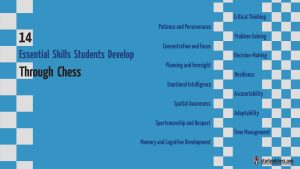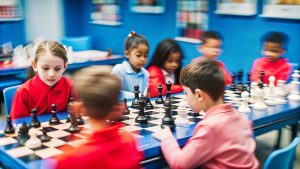14 Essential Skills Students Develop Through Chess
Chess is more than just a game; it’s a powerful educational tool that nurtures a wide range of cognitive and emotional abilities. The skills students develop through chess are essential not only for academic success but also for personal growth. By engaging in this strategic and mentally stimulating activity, students learn to think critically, solve complex problems, and make well-informed decisions. These valuable skills help them excel in various subjects, from math and science to literature and social studies.
In addition to cognitive benefits, chess teaches students patience, perseverance, and emotional resilience. The game challenges players to stay focused, adapt to changing circumstances, and handle both victories and defeats with grace. By developing these core competencies, students gain a solid foundation for success in school, extracurricular activities, and life beyond the classroom. Whether they’re navigating academic challenges or personal decisions, the skills honed through chess provide them with the tools to thrive.

-
Critical Thinking
Chess teaches students develop the processes of critical thinking in analyzing various moves and predicting outcomes. In all games, one has to take a look at various moves in terms of threats and opportunities, weighing pros and cons of each move. This skill is not only important in playing chess but also in mastering other academic subjects, particularly mathematics, science, and literature, where logical reasoning is needed.
How Chess Develops Critical Thinking:
- Encourages students to assess situations carefully.
- Teaches the importance of considering multiple possibilities before acting.
- Develops the ability to solve complex problems with a systematic approach.
-
Problem-Solving
The chess game brings the players into a problem-solving tussle. Every game has a new problem to be solved as to how one might keep their pieces intact or trap the opponent’s king. With frequent problem posing, students tend to perform excellently by thinking on their feet and trying to come up with a creative solution.
How Chess Improves Problem-Solving:
- Encourages creative solutions to difficult problems.
- Helps students learn how to think outside the box.
- Teaches perseverance in finding answers to complex challenges.
-
Decision-Making
Chess is a game of thinking under pressure. Every move in chess could make all the difference, so students will have to think out and weigh their actions cautiously. This will allow them to feel far more confident when making decisions either in chess or in real life.
How Chess Enhances Decision-Making:
- Students learn to make quick, effective decisions.
- Encourages evaluating options and making informed choices.
- Teaches the impact of each decision on future outcomes.
-
Patience and Perseverance
Success in chess does not come from rushing through the game, but from being patient enough and able to persevere through tough situations. Students learn that many times, the most effective strategy is to wait for an appropriate moment to strike, rather than to jump at a decision impulsively. It was here that he taught them valuable assets: the virtue of patience and persistence throughout their lives.
How Chess Builds Patience and Perseverance:
- Encourages students to stay focused even when the game becomes challenging.
- Teaches the importance of waiting for the right opportunity.
- Builds resilience in the face of setbacks or losses.
-
Concentration and Focus
Chess requires a high degree of concentration. One moment of distraction, and you may lose the game. The student has to listen carefully to his actions and to the opponent’s game plan. Concentration would help students develop a sustained attention span that is helpful in maintaining focus on academic activities or other events happening in life.
How Chess Improves Concentration:
- Requires intense focus and attention to detail.
- Helps students ignore distractions and stay on task.
- Develops the ability to maintain focus during long periods of mental activity.
-
Planning and Foresight
The concept of success within chess is related to planning and thinking a few moves in advance. Students learn to anticipate their opponent’s move and to plan accordingly for a strategy. This skill transfers directly into success within academics and personal life where foresight and planning are essential.
How Chess Enhances Planning Skills:
- Teaches students to plan several steps ahead.
- Encourages thinking about long-term consequences.
- Helps students develop the ability to strategize effectively.
-
Emotional Intelligence
Chess helps students enhance emotional intelligence as they learn how to handle their emotions during the game, may it be frustration from a poor move or excitement from a strategy that will lead to winning.
How Chess Builds Emotional Intelligence:
- Teaches students to manage their emotions, especially during high-stress situations.
- Helps students develop empathy by considering their opponent’s perspective.
- Encourages self-awareness and reflection on emotional reactions.
-
Resilience
Failure is inevitable in playing chess. But every loss is an opportunity to learn. Chess teaches the student how to arise from losses, build resilience that will be quite helpful either in academics or even life’s challenges.
How Chess Develops Resilience:
- Chess teaches students to view losses as learning experiences.
- Encourages perseverance and a growth mindset.
- Helps students build the mental toughness to overcome setbacks.
-
Accountability
Everything that happens in chess is a direct result of a player’s decision. That teaches students to be responsible for their victories and losses. Accountability in life is a great skill that can lead to better decision-making and personal development.
How Chess Encourages Accountability:
- Students learn to take ownership of their decisions.
- Encourages personal responsibility for both successes and failures.
- Helps students develop a sense of self-awareness and responsibility.
-
Adaptability
Rarely do chess games go as planned; players are mostly forced to change strategy as the development of the game dictates. This strategizing flexibility will translate to make the students flexible, able to fit into any new situation-an essential component of today’s fast-paced, ever-changing world.
How Chess Builds Adaptability:
- Teaches students to adjust their plans when new challenges arise.
- Encourages flexibility in thinking and problem-solving.
- Helps students stay calm and collected when things don’t go as planned.
-
Spatial Awareness
Chess further helps students develop a concept of spatial awareness in that they are asked to actually see the chessboard in their head and plan ahead. This is particularly helpful when it comes to things like geometry and science, where space is of importance.
How Chess Improves Spatial Awareness:
- Chess teaches students to visualize and predict movements on the board.
- Helps students develop better spatial reasoning skills.
- Encourages awareness of positioning and movement.
-
Sportsmanship and Respect
Chess teaches students the spirit of good sportsmanship: students learn to respect their opponents, whether they win or lose, and appreciate the game of chess itself. The sense of respect and sportsmanship then carries on outside of the chessboard into everyday interactions with others.
How Chess Teaches Sportsmanship:
- Encourages mutual respect between players.
- Teaches students to handle both victory and defeat gracefully.
- Helps students understand the importance of fair play and respect.
-
Memory and Cognitive Development
Chess teaches students develop their memories and cognitive abilities. A student needs to remember the previous moves and strategies that have been adopted while setting future moves, hence strengthening the short-term and long-term memory.
How Chess Enhances Memory:
- Encourages students to recall previous games and strategies.
- Improves cognitive development by challenging the brain.
- Helps students develop better memory retention and recall abilities.
-
Time Management
In clock tournaments, students learn to balance speed with accuracy, finding ways to make effective decisions under pressure. This does indeed carry over into other parts of academic life where timing is important: taking exams, for example, or meeting deadlines.
How Chess Develops Time Management:
- Teaches students to manage time efficiently while making decisions.
- Encourages quick thinking without sacrificing quality.
- Helps students learn how to balance multiple tasks within a limited timeframe.

Conclusion
Chess is not just a pastime; it’s a dynamic tool for learning that empowers students to develop essential life skills. The skills students develop through chess—from critical thinking and problem-solving to emotional intelligence and resilience—prepare them for success in academics and beyond. By facing each challenge on the chessboard, students learn to strategize, adapt, and persevere, qualities that translate directly to real-world situations. These skills help students excel in school, manage responsibilities, and confidently navigate life’s obstacles.
Incorporating chess into a student’s routine can unlock their full potential by sharpening their cognitive abilities while also fostering important emotional and social growth. The skills students develop through chess equip them with the mental clarity and emotional strength needed to face challenges head-on. Whether mastering complex subjects or learning to handle life’s ups and downs, chess provides a lasting foundation for personal and academic success.
We’ve prepared a podcast to accompany this article, offering the same insights in an audio format. If you enjoy listening, give it a play!
References:
- Chappell, M. (2018). “The benefits of teaching chess to children.” Educational Studies in Mathematics, 99(3), 251-263.
- Burgoyne, A. P., et al. (2016). “The relationship between chess skill and cognitive ability: A systematic review.” Intelligence, 57, 43-49.
- Sala, P., Gobet, F., Campitelli, G., & Hambrick, D. Z. (2017). “The relationship between chess and academic achievement: A meta-analysis.” Review of Educational Research, 87(3), 505-536.
- Rios, J., & Munoz, A. (2019). “Teaching chess to children: Effects on cognitive and emotional development.” Journal of Educational Psychology, 111(2), 350-362.
- Leikin, R., & Zazkis, R. (2018). “Mathematical creativity and mathematical thinking: The role of chess.” Educational Studies in Mathematics, 97(1), 1-16.
- McKeen, K. (2017). “Chess: A tool for learning and personal growth.” International Journal of Educational Research, 8(4), 200-210.



0 Comments